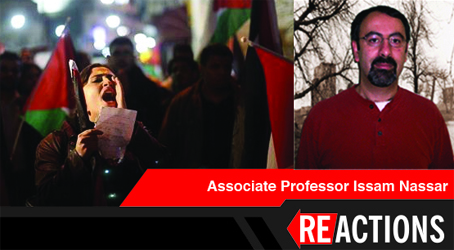Reactions is a new column from Report seeking faculty reactions to news and issues.
Associate Professor of History Issam Nassar was in Palestine this summer during the fighting between Israeli forces and Hamas. Thousands have been killed or injured in the hunt for tunnel systems Israel says are being used to funnel arms to Hamas in Gaza. The international community has voiced concern over the staggering number of Palestinian civilian deaths, yet Nassar calls these condemnations by many world leaders “lip service.”
Nassar:
I was in the West Bank, so my family did not have to suffer the massive rocket fire attacks in Gaza, but there was a feeling of devastation and anger about the Israeli offensive. The loss of civilians was unprecedented, as was the intensity of the bombing.
When the rocket attacks came – and they came often – civilians had nowhere to go. There are no bomb shelters in Gaza. Israel was targeting Hamas, but Hamas is a movement from within the people. They do not have military bases. Palestinians do not necessarily support Hamas, but it is difficult for others to differentiate that.
In many ways, I think Israel hoped that the intense rocket attacks would turn Palestinian civilians against Hamas, but the opposite happened. I attended a rally where I saw Christians and Muslim clerics, Islamists and mainstream ideologists – people you would never think would be together on any issue. They marched together protesting the slaughter. The bombings, in essence, created a feeling of unity for everyone in Palestine.
At the same time, I’ve never seen international support for the Palestinians greater than it is now. There are protests and rallies in major cities all over the world. World leaders might condemn the deaths, but little else is done. The United States provides the arms and asks Israel not to use them on schools or against civilians. Egypt brokers temporary ceasefires, yet keeps its border with Gaza closed to Palestinians who could flee the bombings. It’s lip service.
The ceasefires are important. Civilians need the chance to help the wounded, bury their dead, assess the damage to homes and other buildings, and find food – if there is any to be found. Many areas have no electricity, and water supplies have been hit. They have no water for baths or cooking or helping the wounded.
I cannot say the ceasefires will lead to a permanent solution, but I do hope for a longer-term peace. The Palestinians are calling for the reopening of air and sea ports, and an end of a life of Gaza under siege.

